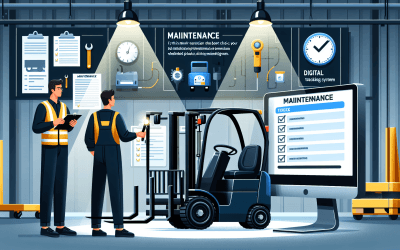If you operate a warehouse or distribution center with a high-usage forklift fleet, you know how...
Full-service forklift maintenance designed to reduce downtime and costs.
Turnkey Forklift Maintenance
People – Equipment – Workflow

Turnkey forklift maintenance is a full-service solution designed to keep your fleet operational, safe, and efficient—without the hassle of managing repairs or scheduling service. It’s ideal for warehouse managers, operations directors, and fleet supervisors who need reliable uptime and expert support.
Our service programs are built around your operation’s needs and cover everything from routine inspections to emergency repairs. We manage the entire process so you can focus on productivity. Coverage typically includes:
- Scheduled preventative maintenance and inspections
- 24/7 emergency repair response
- On-site service and parts management
- Fleet tracking and maintenance reporting
- Custom service plans for electric, propane, and diesel forklifts
It’s a complete maintenance solution that saves time, reduces downtime, and extends equipment life.
Full-Service Forklift Maintenance Solutions for Maximum Uptime
Preventative Maintenance Plans
Emergency Repair Coverage
Customized Maintenance Programs
Learn More From Our Blog
How to Choose the Best Forklift Maintenance Strategies
When it comes to maintaining your forklifts, choosing the right maintenance strategies is crucial...
The Benefits of Forklift Maintenance Management Systems
Warehouse operations are a crucial component of any business that deals with inventory management...
How to Implement Forklift Maintenance Procedures
In the world of warehouse operations, forklifts play a crucial role in ensuring efficient and...
How to Choose the Best Forklift Maintenance Programs
In today's fast-paced and competitive business environment, warehouse optimization is crucial for...
The Importance of Forklift Engine Maintenance
Proper maintenance of forklift engines is essential for ensuring optimal performance and longevity...
Why Choose HCO Innovations for Turnkey Forklift Maintenance?
When downtime costs money, you need a maintenance partner who delivers speed, consistency, and expertise. At HCO Innovations, we take full responsibility for keeping your forklifts in top condition—from routine service to emergency support. We handle everything so your team doesn’t have to.
- All-inclusive service contracts tailored to your operation
- Certified technicians for all major forklift brands
- Responsive emergency repair services to reduce downtime
- Fleet health tracking and performance reporting
- Simplified billing and a single point of contact
Our turnkey approach ensures your equipment runs efficiently, safely, and without interruption—so you can stay focused on moving your business forward.








